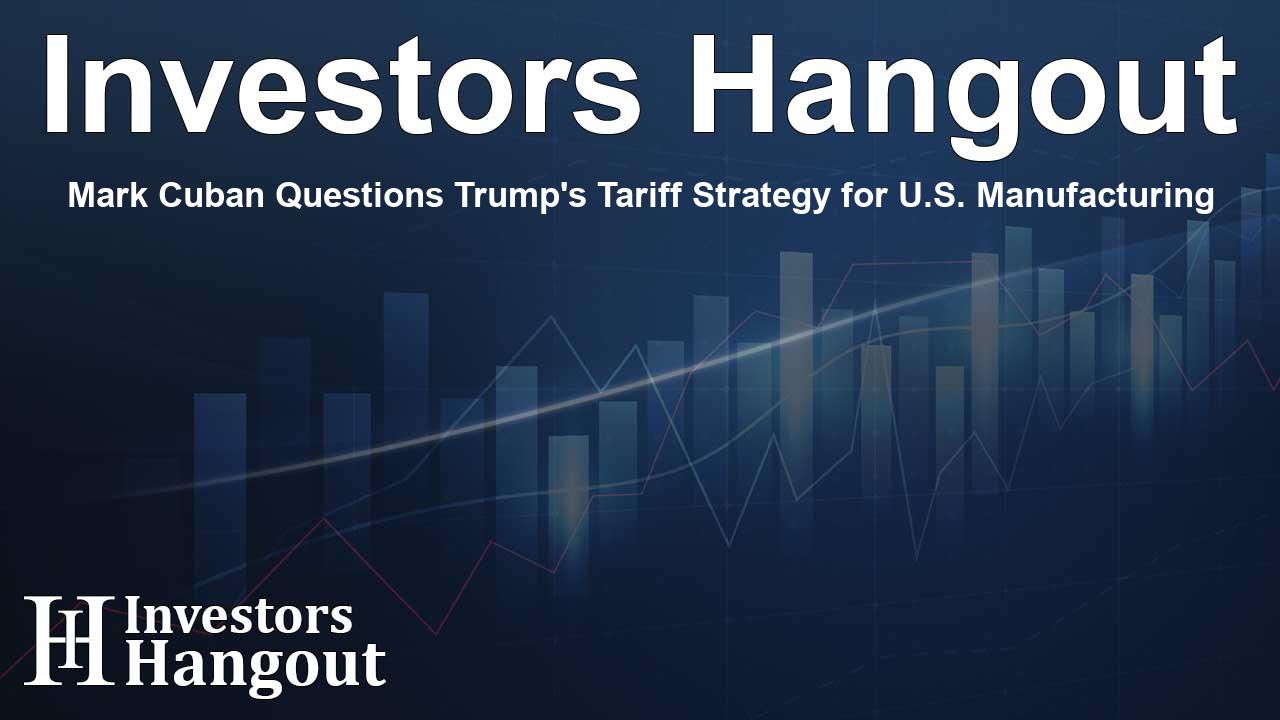Mark Cuban Questions Trump's Tariff Strategy for U.S. Manufacturing

Mark Cuban's View on Trump's Tariff Strategy
Mark Cuban, known for his role on Shark Tank, has recently voiced his concerns regarding former President Donald Trump’s approach to rejuvenating U.S. manufacturing through tariffs. Cuban took to social media to unpack the complexities of this topic, outlining the potential pitfalls of relying solely on tariffs as a means of achieving economic goals.
Cuban's Critique on Social Media
In a recent post, Cuban articulated his skepticism about Trump’s intentions, suggesting that while he believes Trump understands the need for increased American manufacturing, he does not grasp what is genuinely required to accomplish this goal. Cuban pointedly asked why Trump has not attempted to enact legislation mandating that all manufacturing occurs within the United States over a designated period. He indicated that relying on tariffs is not a viable substitute for such authoritative measures.
Understanding the Complexity of Manufacturing
Cuban emphasized the difference between imposing tariffs and legislating a manufacturing change. As President, Trump possesses the ability to set tariffs quickly, while laws require a more extensive political process to pass. Cuban described this approach as fundamentally flawed, stating, “That’s how crazy his approach is.”
The Impact on Major Corporations
In another interaction on social media, Cuban highlighted the challenges that American companies, particularly large entities like Deere & Company (NYSE: DE), would face in complying with Trump’s tariff strategies. He pointed out the significant time required for these companies to adjust their manufacturing plans, relocate facilities, or expand existing factories in the U.S.
Concerns About Delays and Outsourcing
His insights suggested that firms may instead choose to delay their expansion plans or outsource production entirely, thereby negating any positive impact intended by the tariffs. Cuban’s perspective underscores an important reality about the manufacturing sector: changes cannot simply be mandated overnight.
Cuban's Continued Criticism of Tariff Plans
As discussions around tariffs gain momentum, Cuban has consistently scrutinized Trump’s positions. Recently, Trump discussed the purported benefits of tariffs during an economic speech, defending their effectiveness. This stance is at odds with Cuban's earlier calls for a more nuanced approach to revitalizing the American auto industry through strategic taxation of foreign entities rather than indiscriminate tariffs.
A Risky Path for American Industry
The stakes are high as Trump’s tariff threats have raised alarms among industry leaders, including Cuban, who expressed concern over their potential impact. For instance, he previously labeled Trump’s proposal of a substantial tariff on John Deere products as a reckless move that could harm a historic American brand. Cuban’s critiques paint a picture of the potential fallout from a tariff-heavy economic policy.
The Significance of Cuban's Remarks
Cuban's reflections on this issue bring to light the complexities entwined with tariff implementation in the U.S. economy. The dialogue surrounding these policies is not merely about numbers; it involves understanding the broader implications for American manufacturing, employment, and industry growth. As the 2024 presidential race heats up, these discussions will likely shape the economic landscape significantly going forward.
Frequently Asked Questions
What is Mark Cuban's stance on Trump's tariff strategy?
Cuban is skeptical, believing Trump doesn’t understand the complexities of implementing tariffs effectively to revitalize manufacturing.
Why does Cuban think legislation is better than tariffs?
Cuban argues that laws require processes that ensure commitment and accountability, while tariffs can be imposed unilaterally without legislative backing.
How do tariffs affect major companies like Deere & Company?
Cuban notes that such companies would face significant challenges in adapting their manufacturing plans under a tariff-heavy policy.
What are the potential consequences of Trump's tariff strategies?
Cuban warns that tariffs could lead to delays in expansion and outsourcing, ultimately harming U.S. manufacturing rather than helping.
How significant are Cuban’s critiques in the political landscape?
Cuban’s insights highlight critical discussions about economic policy, which could impact the approach candidates take in the upcoming elections.
About Investors Hangout
Investors Hangout is a leading online stock forum for financial discussion and learning, offering a wide range of free tools and resources. It draws in traders of all levels, who exchange market knowledge, investigate trading tactics, and keep an eye on industry developments in real time. Featuring financial articles, stock message boards, quotes, charts, company profiles, and live news updates. Through cooperative learning and a wealth of informational resources, it helps users from novices creating their first portfolios to experts honing their techniques. Join Investors Hangout today: https://investorshangout.com/
Disclaimer: The content of this article is solely for general informational purposes only; it does not represent legal, financial, or investment advice. Investors Hangout does not offer financial advice; the author is not a licensed financial advisor. Consult a qualified advisor before making any financial or investment decisions based on this article. The author's interpretation of publicly available data shapes the opinions presented here; as a result, they should not be taken as advice to purchase, sell, or hold any securities mentioned or any other investments. The author does not guarantee the accuracy, completeness, or timeliness of any material, providing it "as is." Information and market conditions may change; past performance is not indicative of future outcomes. If any of the material offered here is inaccurate, please contact us for corrections.